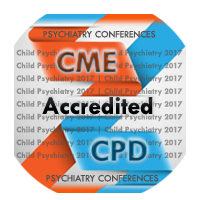Arnel Banaga Salgado
RAK Medical & Health Sciences University, UAE
Title: Applied functional emotive existential therapy for the caregivers of children with mental disorders
Biography
Biography: Arnel Banaga Salgado
Abstract
The care of children with mental disorder often takes negative tool to all the caregivers. Most of the time, they are affected psychologically, emotionally and spiritually leading to loss of meaning, and in some cases, they are affected with severe depression bordering into psychopathological condition such as mood disorder and schizophrenia. The institute that was founded by Dr. Arnel Banaga Salgado, implemented its psychosocial intervention called Functional Emotive Existential Therapy in two stages: (a) For the caregiver, and (b) for the immediate family members of children with schizophrenia. The three main tasks of therapy are the following: (a) To assist clients in recognizing that they are not fully present in the therapy process itself; (b) to support clients in confronting the anxieties that they have so long sought to avoid; and (c) to help client redefine themselves and their world in ways that foster greater genuineness of contact with life. The immediate family members of children with mental disorders are otherwise responsive to the following phases of the program, (a) Functionality assessment and therapy, (b) Existential assessment and therapy, and (c) Emotional assessment and therapy. The results both for the caregivers and immediate family of the client are promising. After 30 days of implementing the FEET’s ABCDE modalities to the caregivers and to the children with mental disorders using GDS and MMSE, the caregivers showed positive signs of improvement particularly in terms of meaning development, diminishing the occurrence of depression, anxiety and other psychopathologic conditions arising from the care of their relatives with dementia. On the other hand, in terms of helping the children with mental disorders, the FEET therapy showed a positive improvement on the decrease of BPSD, increasing functionality, simple memory and finding meaning on their activities of daily living. The FEET should be implemented in other areas, including hospice care, assisted living or nursing homes and other mental health facilities.

